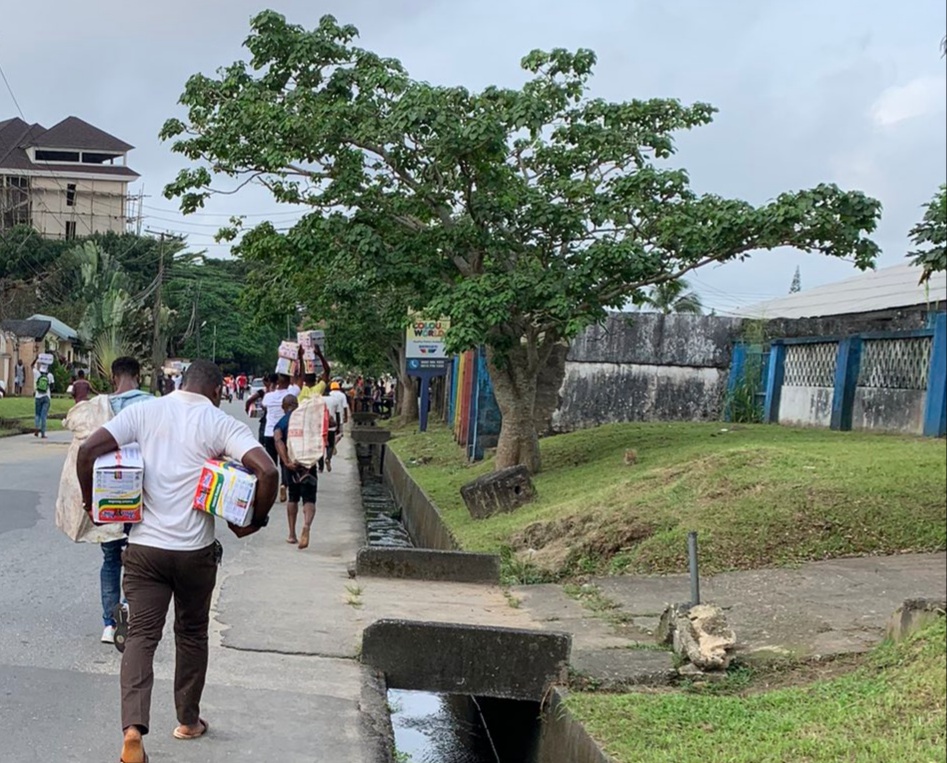BY UTHMAN SAMAD
While Reynolds Construction Company (RCC) boasts of adequate measures to prevent accidents, pollution and other adverse effects of its rock blasting activities, Dataphyte’s investigation exposes how unhealthy practices by the company and government’s sheer regulatory failure endanger the lives in Ogunmakin, a border community in Ogun state, south-west Nigeria.
On a mildly sunny afternoon in December 2020, Comfort Ajegunle, 78, was taking a nap in one of the rooms in her six-bedroom apartment before an explosive sound jolted her awake. Although not strange, it still caught her unawares.
She had forgotten that it was one of those days and had missed the public announcement from Reynold Construction Company (RCC) notifying members of the Orile Ogunmakin community of the commencement of blasting operations for the day.
Advertisement
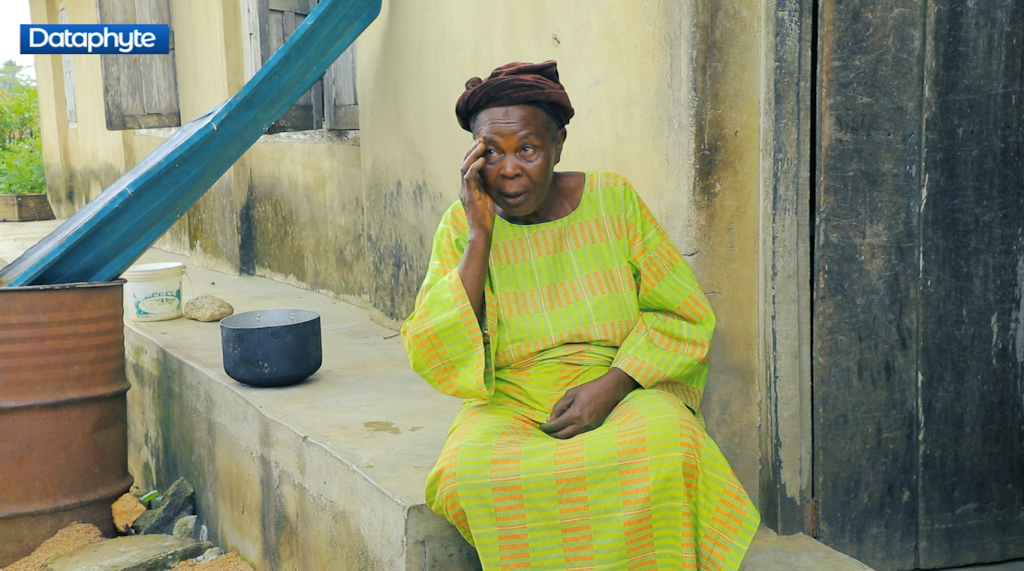
Since 2013 when it began operations, RCC has been blasting rocks to source granite three times weekly — Mondays, Wednesdays and Fridays in Onituruku village for the construction of the Lagos-Ibadan expressway. While Onituruku is in Oyo state, it shares borders with Orile Ogunmakin which is in Ogun state. The two communities are delineated by the Omi river.
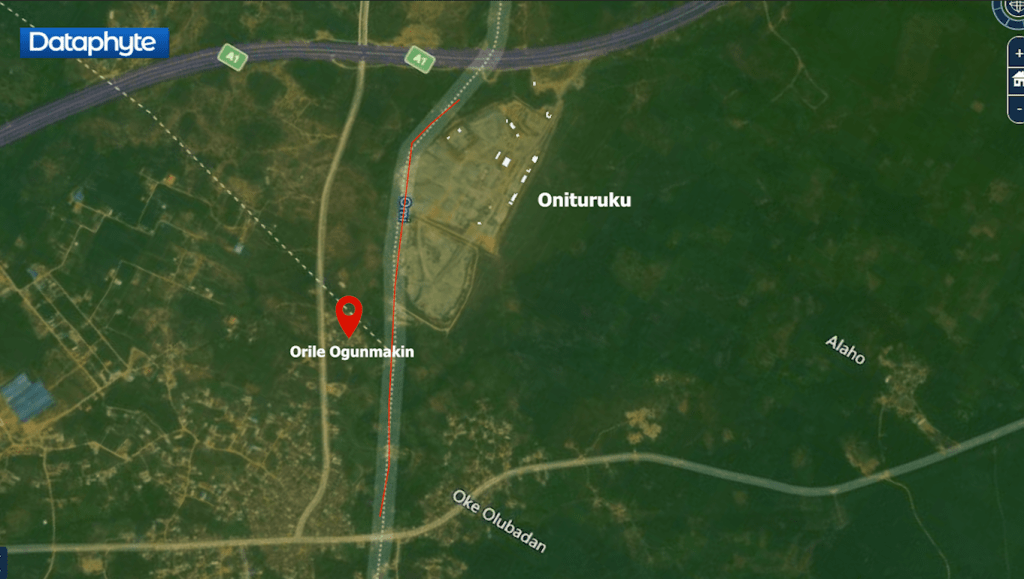
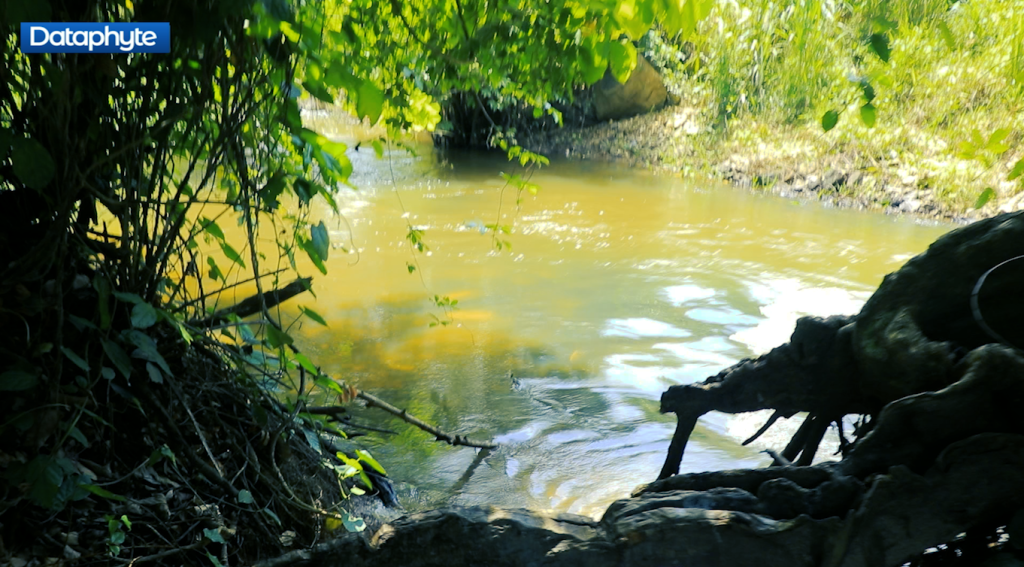
Asleep or awake, sick or dying, in rain or blazing heat; citizens of Orile Ogunmakin must scramble out of their homes and head towards the community hall built by RCC once the siren indicating the commencement of blasting activities is heard.
Advertisement
For those three days, the construction company would send an official escort to the community and police officers with a siren-blaring van, calling on the people of Orile Ogunmakin to leave their houses for a newly built community hall.
The hall, although just as cracked as the houses, serves as a refuge from flying rocks that usually emerge from the nearby blasting site.
Had Comfort remembered, she would have prepared ahead of time by taking cover at the community hall but it was already too late for her to head for the hall. Blasting had already begun and she came fully awake when a big rock particle hurtled through her roof, landing just whiskers from her head on the bed where she lay.
The widow scampered to safety but according to her, she developed cluster headaches after the incident. She would later spend her savings at the Federal Medical Centre (FMC), Abeokuta in Ogun state, seeking medical attention for eye problems she developed as a result of the cluster headache.
Advertisement
“It felt as if my eyes would fall from their sockets,” she said while narrating how it happened.
Comfort told Dataphyte that some days after the incident, the safety managers of RCC came to her house for assessment but that was the last time she saw the officials.
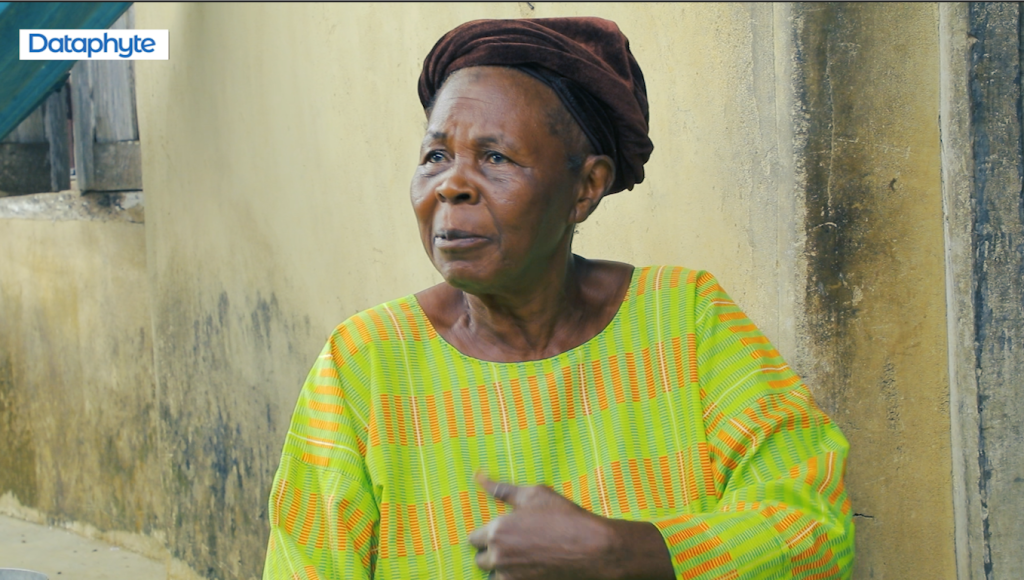
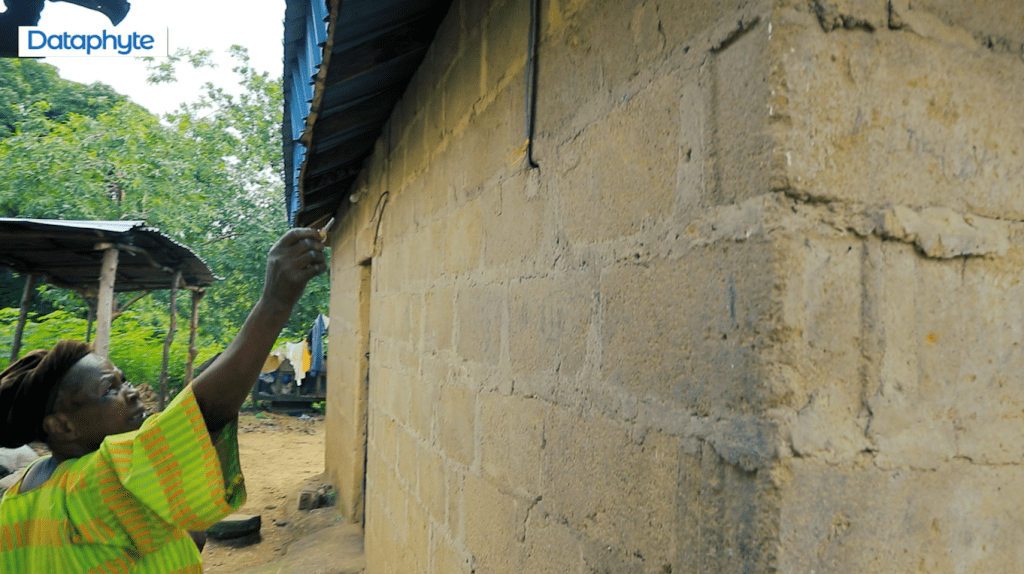
Beyond the costs of her eye care, the septuagenarian has also continued to spend on plastering over the cracks on the walls in her home. The house was all her late husband left for her and she will do everything to protect the inheritance.
“The buildings keep on cracking from inside. There is a part of this house that will soon fall,” said Comfort in a tone that barely bellies her anguish.
Advertisement
The compound houses three clustered apartments, each with at least six rooms which she rented out to tenants.
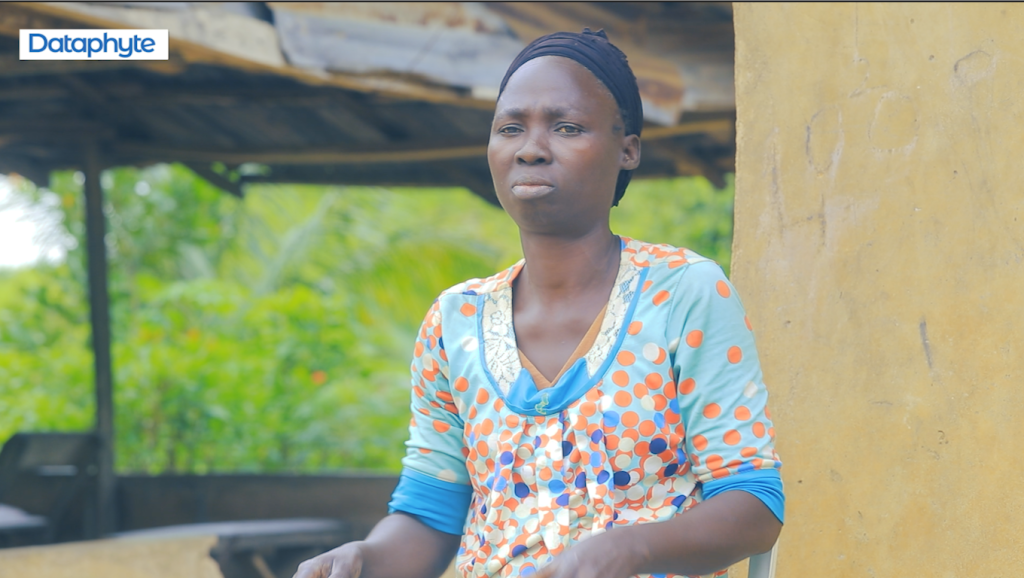
One of the tenants in Comfort’s home is her son, Joseph Adegunle. Joseph is married and has a son. The trio has hearing and speaking disabilities. They can’t hear the warning siren of the RCC officials whenever they want to blast. They are always at the mercy of kind co-tenants to communicate with hand gestures, adopting a crude form of sign language to get them to safety.
Advertisement
Yemisi, Joseph’s wife, expressed her worry and displeasure at RCC’s activities.
“We don’t have rest of mind here. As you can see, this house belongs to my father-in-law; everything is in ruins. Whenever we are cooking and they want to blast, they would tell us to remove our pots from the fire and leave for the hall.”
Advertisement
‘Displaced from her sleeping position’
The tale of gross discomfort and horror is not peculiar to Comfort and her family alone.
Mary Ayinde, wife of a pastor in the same community, was sleeping on a mat inside the church when she was violently woken up by heavy vibrations. Apparently shocked, Mary said her heart began beating faster.
Advertisement
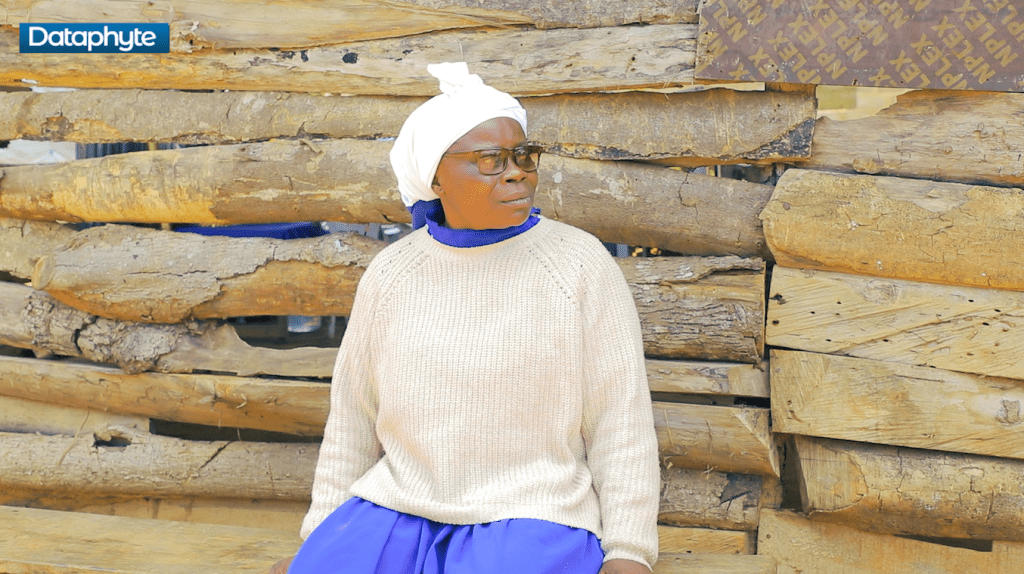
When she got out of the house, it was an apocalyptic scene, the sky was covered with dust and it would take some minutes before it settled.
The heart palpitations persisted until she was told that she had developed high blood pressure when she visited a private hospital in Ibadan, Oyo state. The doctor placed her on drugs and she is unable to sleep if she fails to take them.
It has been three years since Mary’s high blood pressure diagnosis and she continues to suffer. The prescribed drugs she takes, no one sells them in Ogunmakin, hence, she has to travel to Ibadan, 40 kilometres away, to get them.
“I have been placed on drugs that if I don’t use the drug I won’t be able to sleep. I have been using drugs every day for the past three years. If I fail to use the drug for one day I won’t be able to sleep. I have been on it till now” an emotional Mary told Dataphyte.
Residents turn part-time occupants in their homes
Mathew Adegunle, a smallholder farmer, had just returned from his farm one evening in July 2018. He was resting in his house awaiting dinner when it began to rain.
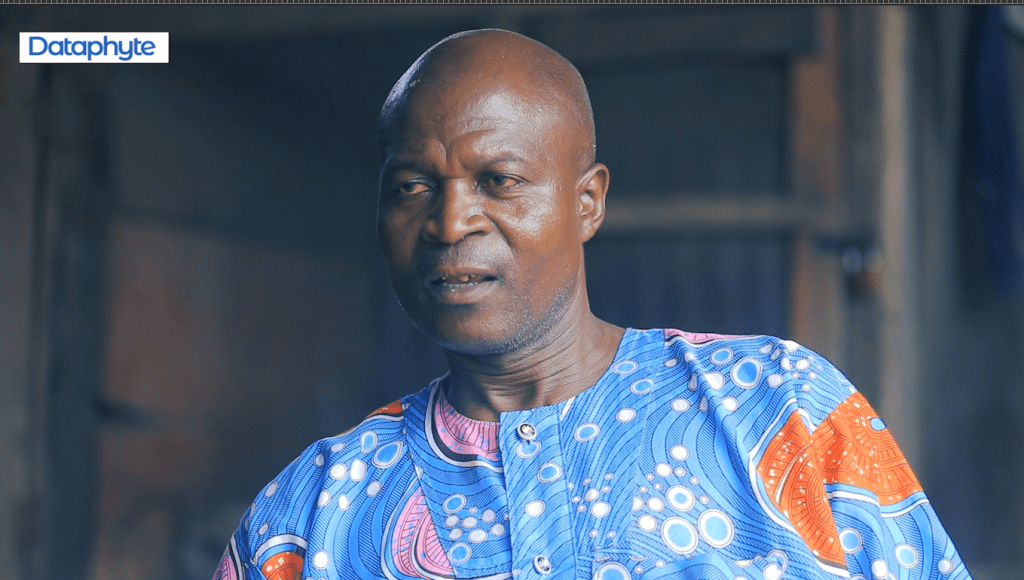
At that exact moment, RCC started blowing the siren, notifying that they wanted to blast rocks in the quarry site behind Mathew’s house. Mathew and his family abandoned the comfort of their home, and the food being prepared, to join other members of the community, heading for the old express road that leads to Ibadan from Ogunmakin.
All under the rain.
Mathew is a son of the land, born and raised in the community. He had all his education up to the tertiary level while living in the same village. If he’s not on the farm, he runs a small milling shop in front of his house. Now, the blasting poses a bigger threat to living and he may resort to leaving the community.
“Before RCC came into this community, we enjoyed our lives better. We were not informed of their arrival. Upon their arrival, they started blasting. The stones do destroy our houses. I am tired and I am considering selling my assets here and leaving. It’s too much,” the father of four lamented.
Timothy Olajide, just two weeks before Dataphyte’s visit to the community, was christening his newborn daughter in a nearby worship building. The rain was falling heavily that day. They were deep into merrymaking when the heavy blast sound brought an abrupt end to the ceremony.
“We were all inside that church for the naming, and they blasted the rock again. We were all scared. There was nowhere to escape”, Timothy narrated.
Blasting for development at the people’s expense
RCC is a subsidiary of a Swiss company, SBI International Holdings AG (SBI). SBI is Shikun & Binui Group’s global infrastructure arm for the implementation of civil engineering, development and construction projects.
Lagos-Ibadan expressway was commissioned in August 1978 during the administration of major-general Olusegun Obasanjo. The 127.6 kilometres-long expressway connecting Ibadan, the capital of Oyo state, and Lagos is the major route to the northern, southern and eastern parts of Nigeria.
The expressway is the busiest interstate route in Nigeria. It handles more than 250,000 vehicles daily and is one of the largest road networks in Africa.
On July 5, 2013, former President Goodluck Jonathan flagged off the reconstruction and expansion works on the expressway. On the occasion, he announced the award of the contract to Julius Berger Nigeria Plc and RCC for repairs on Section 1 (Lagos-Sagamu Interchange) and section II (Sagamu Interchange-Ibadan) respectively. The contract was awarded for N167 billion.
To meet up with the federal government’s mandate, RCC resorted to blasting a big rock in Onituruku which is in Oyo state. The blasting site is adjacent to Orile Ogunmakin.
Google Earth, an open-source app using satellite imagery, aided Dataphyte’s investigation in ascertaining the distance between the blasting site and residences. From the last house in Orile Ogunmakin to the blasting site is 230.08 metres, which is 0.23 kilometers. The blasting site is a mere estimated755 feet away from houses in Orile Ogunmakin.
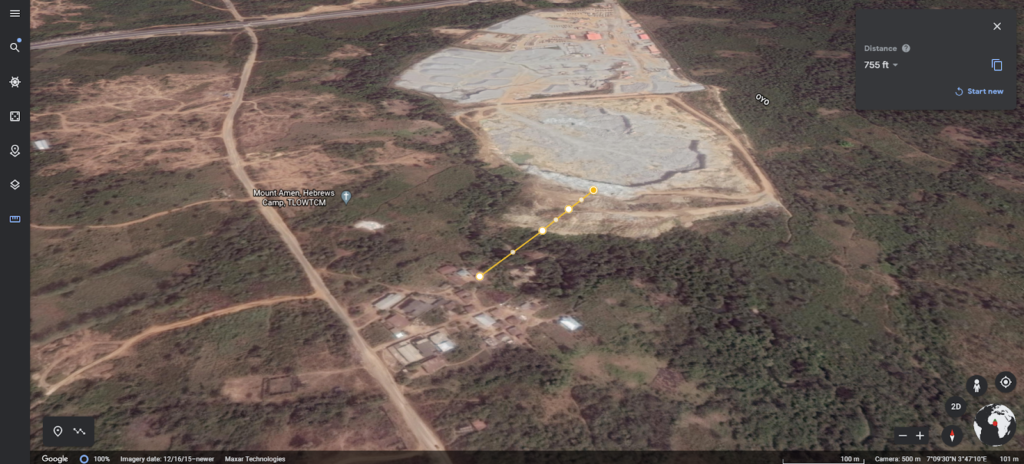
According to the National Environmental (quarrying and blasting operations) Regulations, 2013, “a person shall not locate a quarry or engage in blasting within three kilometres (3km) of any existing residential, commercial or industrial area”.
Blasting is generally adopted for rock excavation; the level of the resulting ground vibration and the structural response depends on the explosive type and weight, delay time, blasting technology, soil properties, the distance between the structure and the blasting centre, susceptibility ratings of the adjacent and remote structures, and the age and type of the structure.
Ezzeldin Yazeed, a professor in the Department of Construction Engineering at The American University in Cairo, noted in a paper that subsurface construction blasting generates ground vibration which may have a damaging effect on residential buildings.
He explained that “when a charge is detonated in a solid medium (like a rock), a family of waves is generated. These waves generate different particle movements and travel at different wave velocities. The resulting ground-borne vibrations may have an effect on residential buildings ranging from disturbing the occupants to causing severe threshold “cosmetic” or structural damage”.
While Dataphyte was unable to determine the exact level of vibration intensity in Orile Ogunmakin, the construction engineering professor documented that “problems may occur as a result of large amplitude (low frequency) vibrations, repeated occurrence of smaller amplitude vibrations, or from differential settlement induced by soil particles rearrangement”.
Jamiu Shurakat, the Baale of Orile Ogunmakin, said the community has over 70 occupied houses in total with many uncompleted ones. Dataphyte sampled over 40 houses in the community and found that none of them is safe from wall crack(s). While some are just cosmetic, many are structural cracks to the extent that house owners resort to possible support systems to save the walls from falling.
Aside from walls falling and cracking based on the heavy vibrations due to close proximity, Dataphyte also captured images of fly rocks on roofing sheets and their impact on glass windows. Many houses in the community with glass windows have been smashed. Many have had theirs fixed countless times or removed totally.
Fly rock, or wild fly rock, is a rock that is ejected from the blast site in a controlled explosion in mining operations. It is considered a significant issue in mining; between 1994 and 2005, 32 miners were injured by fly rocks.
Dataphyte reviewed that globally, the majority of fly rock incidents go unreported or unnoticed, and in most jurisdictions, incidents of fly rock that do not leave the blast area or that do not cause injury or death within or outside the blast area are not officially reported.
The Ontario Ministry of the Environment fined Austin Powder Ltd. $130,000 in May 2014 for its blasting activities that caused fly rock accidents on July 20 and 23, 2009. In the first incident, a small rock struck a worker at a neighbouring business on the arm. In the second incident, rocks were observed flying well beyond the control area. A scale house located 230 metres from the blast was struck by a number of rocks. Two vehicles held at a controlled stop along nearby Young Road on the edge of the quarry property located about 300 metres from the blast were also struck by rock resulting in extensive damage.
No authority, environmental or otherwise, has spoken up for the people of Orile Ogunmakin.
Falling walls and hurtling stones
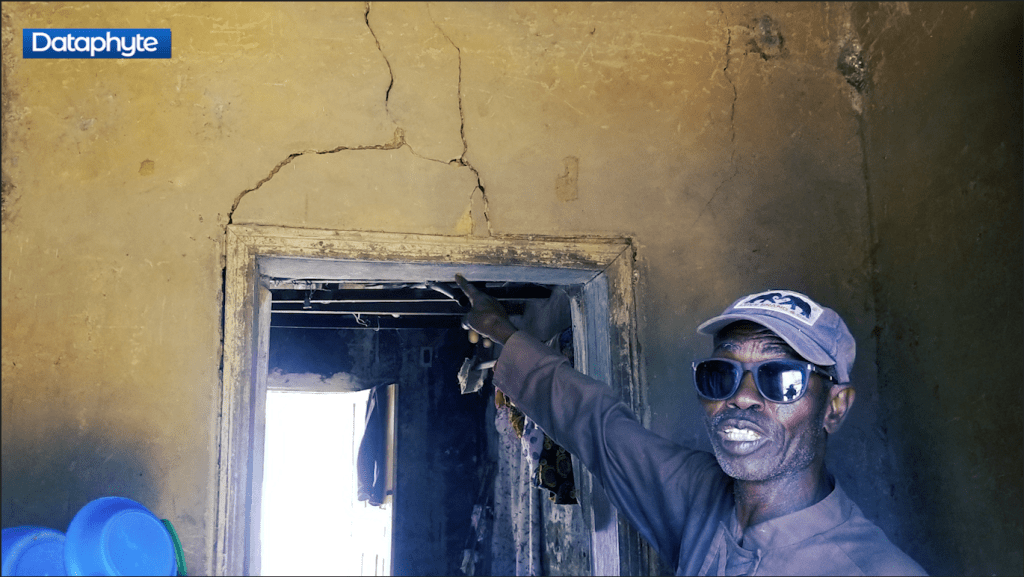
According to claims and evidence captured in the community, there is no house without at least one threshold crack. The allegations that the heavy vibrations cause the crack were confirmed by Dataphyte, given the proximity of the blasting site to residences in Orile Ogunmakin.
Even the big hall, which took RCC many years to complete, is filled with cracks similar to many of the houses in the community.
Seismologist: Orile Ogunmakin in great environmental & health danger
Falade Ayomiposi, a geoscientist and seismologist at the Earthquake and Space Weather Laboratory, Department of Geology, Obafemi Awolowo University (OAU), Ile-Ife, on viewing the satellite imagery detailing the distance between Orile Ogunmakin and the RCC blasting site, explained that “the explosives mostly utilised in mining activities are either Ammonium Nitrate Fuel Oil (ANFO) or dynamite”.
He added: “These explosives when being utilised generate airwave vibration (in the form of noise) and soil vibration. Both vibrations disturb the building. The airwave vibration affects the walls and roof buildings, while soil vibration enters through the basement causing temporary movement of the buildings’ foundation. This leads to displacement of properties put on walls and shelves.”
Falade said the cracks seen on the houses in Orile Ogunmakin may be structural/cosmetic cracks resulting from the inferior materials used for the construction and consistent vibration above the recommended United States Bureau of Mines (USBM) threshold (0.5 IPS). He said this could result in the permanent displacement of building foundation resulting into structural cracks on the walls.
Falade also pointed out that noise from blasting, which could have exceeded the recommended threshold of 114 dB, could affect human health and also cause structural damage to buildings in Orile Ogunmakin.
He noted that vibrations felt in this community would have not been more intense if they were 3 km away from the quarry site.
‘Dust in the cloud’
Many of the community members interviewed testified that blasting of the rocks comes with clouds of dust.
The main occupation of Ogunmakin people is farming and yam flour processing and the residents said they see the dust on the yam flakes and the leaves of plants in their nearby farms. The health implications of such dust are even higher, however, while the residents know that dust is not good for their health, they don’t know the extent of the impact such environmental pollution can have on their short and long-term health.
A research, published in August 2020, which investigated the health effects of dust exposure on people living close to quarry sites compared with those who live far from the quarry sites in Palestine, revealed that environmental exposure to dust from quarrying activities could pose health dangers to the population living nearby.
The results highlight the importance of developing and strictly enforcing rules and regulations in Palestine to protect population health.
In the research, a cross-sectional comparative study was conducted among 79 exposed participants, who lived less than 500m away from the quarry sites, and 79 control participants who lived more than 500m away. All participants answered a questionnaire on dust exposure at home and health effects, as well as performed a lung function test in which both reported and measured health effects were investigated.
People who live in close proximity to the quarry sites reported exposure to dust at home (98%), land destruction (85%), plant leaves covered with dust (97%), and an inability to grow crops (92%).
The research also recorded that the exposed group reported significantly higher eye and nasal allergy (22% vs. 3%), eye soreness (18% vs. 1%), and dryness (17% vs. 3%), chest tightness (9% vs. 1%), and chronic cough (11% vs. 0%) compared to the control group.
Lung function parameters were significantly lower among the exposed group compared to the control group; mean forced vital capacity (FVC) was 3.35 L vs. 3.71 L (p = 0.001), mean forced expiratory volume in the first second (FEV1) was 2.78 L vs. 3.17 L (p = 0.001).
Higher levels of airway restriction were found among the exposed group. Among the exposed group, lung function parameters worsened with the increasing closeness of home to the quarry site.
The coming of RCC and how it reneged on promises to residents
Available information gathered by Dataphyte from different sources in Orile Ogunmakin shows that RCC entered the community in 2012 but started blasting in 2013. Although RCC claims it operates on Oyo state’s land, its rock blasting site borders and is closest to Orile Ogunmakin.
According to the Baale of Orile Ogunmakin, Jamiu Shukurat, before the commencement of the blasting operation in the community, the RCC management had a meeting with the whole community. During the meeting, RCC promised to provide social amenities for the community and signed a memorandum of understanding to this effect.
“They came to have a meeting with all of us in the community to inform us that they saw a big mountain at Oke-Ibadan and made some agreements with us. They agreed to dig a borehole for us, give scholarships to our children, and build a hall for us because when they are blasting, the rock particles find their way into our community,” the Baale explained.
However, only the just completed hall has been delivered, out of all the promises made. The Baale noted that “as I am talking to you, none of us is employed in RCC. Every other thing they promised to do for us, we can not get hold of any among them”.
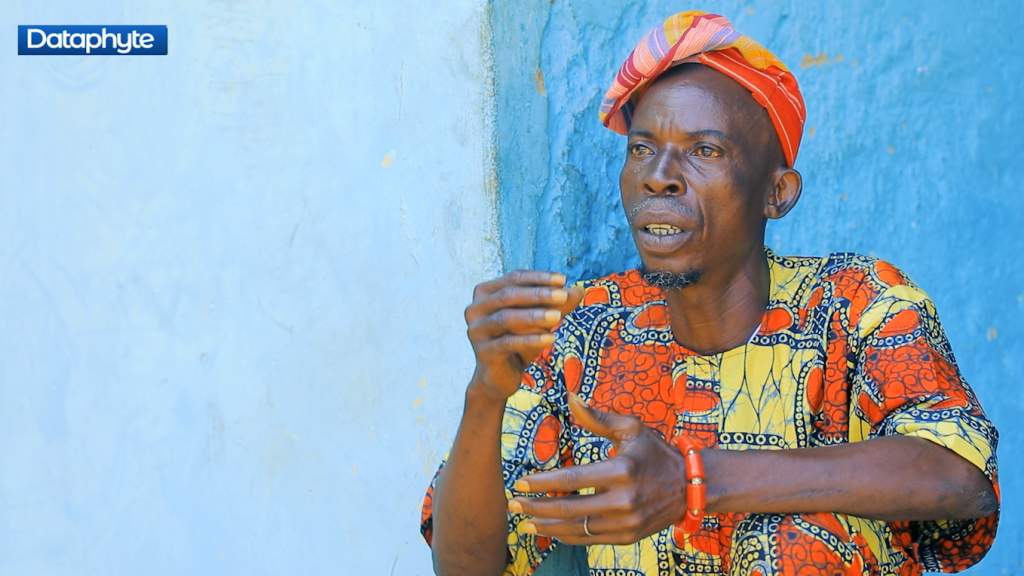
In 2017, the Olu of Ogunmakin, Oba Olugbenga Sodiya, told Vanguard that the reason the community did not trouble RCC at the initial stage was that they were told that the rock blasting was not for commercial purposes but for the construction of the Lagos-Ibadan Expressway.
The king added that “in 2014, all the families in our community held a meeting with RCC and signed a memorandum of understanding (MoU) that they should compensate people that own houses close to where RCC is working. Based on the MoU, each compound got N100,000 compensation and they promised to construct a town hall complex and to provide potable water”.
On September 24, 2021, in a phone conversation with the Olu of Ogunmakin, the king further explained to Dataphyte that a total of N5 million was presented to the people of the community by RCC after a series of meetings and disagreements. He said at the time, only 35 houses were built in Orile Ogunmakin and all got N100,000 each amounting to N3.5million in total, and this “gift” was tagged ‘empowerment’ and could not be called ‘compensation’.
“RCC agreed to pay the community a sum of Five million Naira, build a hall and promised to do other things. We asked them to put it in writing. They did that. For record purposes, each house collected N100,00. RCC tagged it as empowerment. Along the line, they brought generators, motorcycles, and others”.
The king said the community will be renewing the MoU with RCC at 5-year intervals, which means as at the time of filing this report, another MoU is binding the community to RCC operations.
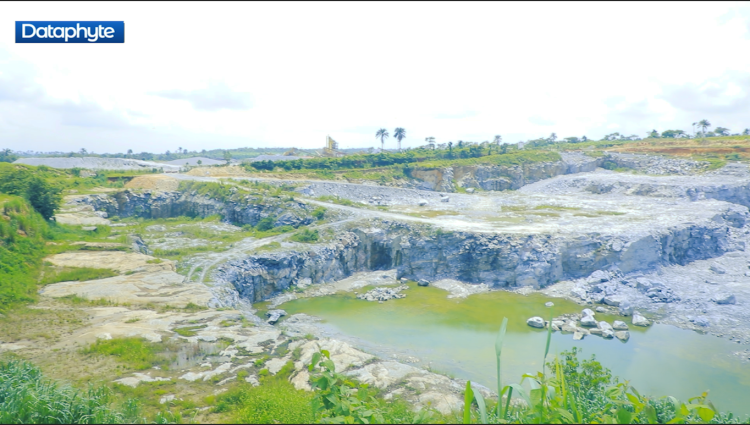
“We were not Considered in the EIA”
Olugbenga Sodiya, the Olu of Ogunmakin, told Dataphyte that when they first noticed an overburden across the Omi river (the river serving as boundary landmark between Oyo and Ogun state), he informed the then chairman of Obafemi Owode local government, Nurudeen Diya Olu.
The king added that he also notified the state ministry in charge of mining and they (the Orile Ogunmakin residents) protested to the blasting site.
Sodiya told Dataphyte that it was through the series of engagements with RCC that he got to see, in the environmental impact assessment (EIA) documents tendered to him, that Ogunmakin was never considered in their assessments despite being less than 1km from the blasting site to their community.
“We later found out that in the environmental impact assessment (EIA) document that Orile Ogunmakin, as a community, was not considered at all. But we didn’t know,” he said.
“The people of the community said we should allow them to see that the blasting is for Lagos-Ibadan express road construction. I showed my grievances and explained that we would suffer the injury if we don’t take action now. Then, most of the people are old people. Right now as I am talking to you, some of them are late.”
The court tussle
Solomon Olabode, a retired priest with the Anglican communion, decided not to just “leave God to judge RCC”. On August 13, 2018, he took RCC before Ogun state high court on behalf of the community.
In a writ of summons made available to Dataphyte, Olabode accused RCC of carrying out quarry activities that have resulted in the destruction of his properties and a storey-building.
The suit seeks an order of perpetual injunction restraining the RCC from furthering its activities at the blasting site. The suit also avers that the RCC “in carrying out the quarry activities did not put in place any technical and economic measure that mitigated the adverse environmental effects of the quarry activities”.
The suit also noted that the quarry activities in the community have continued to result in the destruction of property/houses, adverse effects on health, and contamination of the environment. He also added that the blasting has made them suffer severe material and financial loss.
Earlier on, May 23, 2017, Olabode’s lawyer, Prince Edoziem of Ahngleighkan & Associates, had written a letter to the RCC demanding the replacement or creation of lost resources and payment of N10 billion compensation.
On October 10, 2017, when the RCC failed to respond to Olabode’s query 5 months after the letter was sent through his lawyer, a pre-action letter to defendant requesting for an amicable settlement of N100 million or seek redress in a court of law was sent.
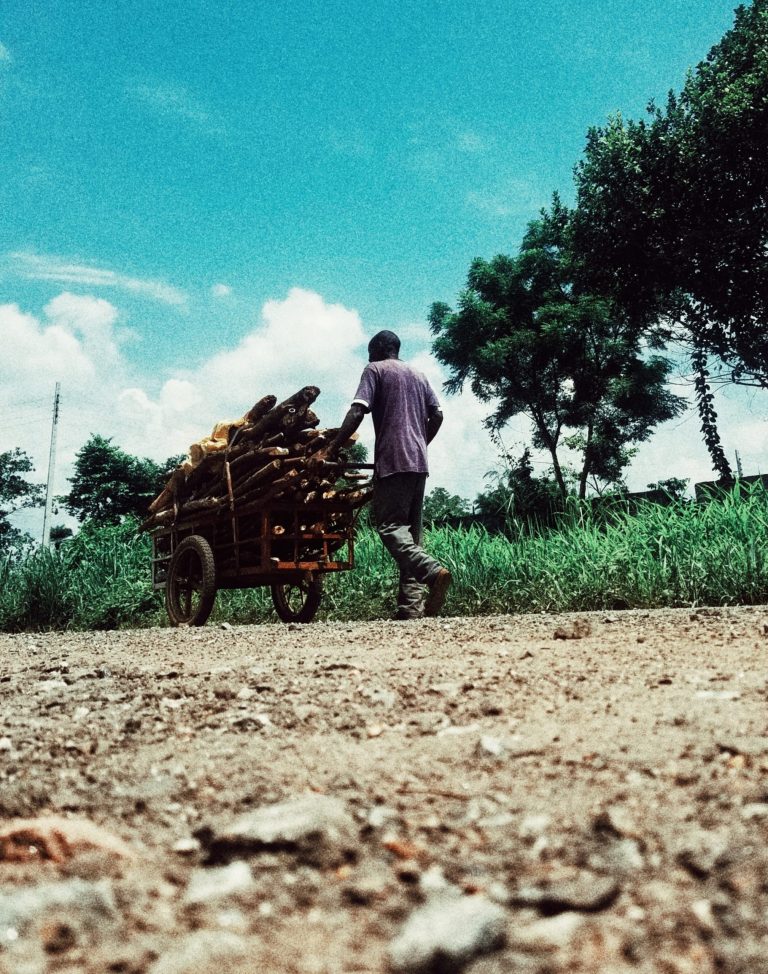
While speaking to Dataphyte in his apartment in Orile Ogunmakin, he said that he was forced to take RCC to court after all his efforts to get the company to take responsibility for their actions proved abortive. But “we have been in court now since 2017 because at various stages, they refused to come to court until we finally broke the line to ensure we brought them to court”.
“Now, they have also involved the court in technicalities which I believe the house might have even collapsed before I get a judgement,” he said.
Now, according to Olabode, the RCC wants the case to be heard in Ibadan (Oyo state) where the blasting site is situated, but he has prayed the court that the case be heard in Abeokuta (Ogun state) because its citizens bear the adverse effect of RCC’s activities. The court ruled in his favour.
“We have appeared in the court in 2017 at three month intervals because once we attend, they will adjourn, but definitely we have been attending once in three months and this is the third year. 2017, 2018, 2019, if not because of Covid-19 (in 2020) that is the only time we did not attend in every 3 months,” he said.
Prince Edoziem, Olabode’s lawyer, speaking with Dataphyte on phone explained that RCC has taken the case to the court of appeal and they await the court to call for sitting.
No cadastral unit registered to RCC in Oyo state
Dataphyte scoured through the valid mining title database of the ministry of mines and steel development and could not find any mining cadastral unit (CU) in Oyo state assigned to RCC. The company however have four such licences in Ogun state.
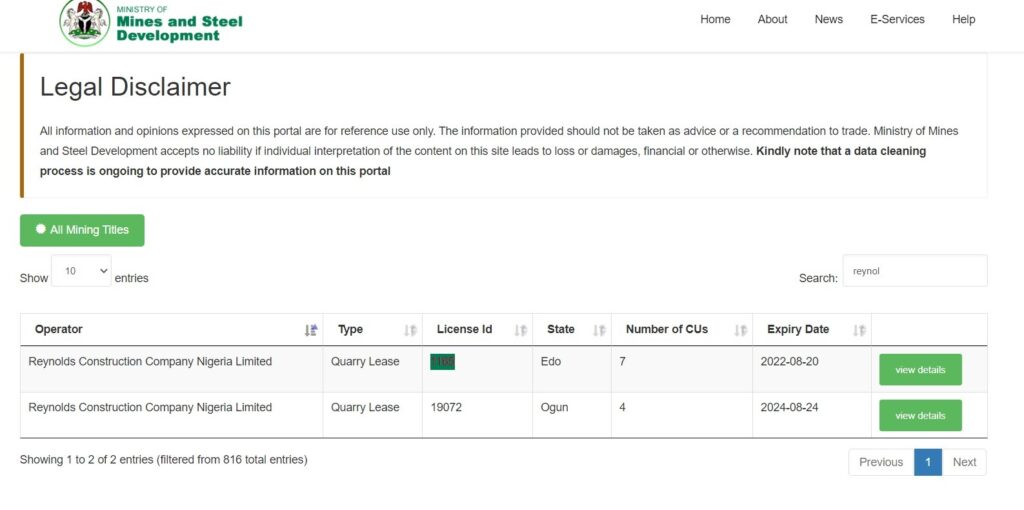
According to the available record, the RCC has 7 CUs with valid quarry lease permits in Edo state which are expected to expire on August 20, 2022, with license identity 1165. The valid quarry lease permit with license identity 19072 in Ijebu East in Ogun state is expected to expire on August 24, 2024.
Ringing Silence from RCC
On September 3, 2021, Dataphyte sent a freedom of information (FOI) letter to the RCC’s managing director’s office in its headquarters in Jabi, Abuja. A hard copy of the letter was also delivered to the office and was received and acknowledged by a CB Charles.
A call was put through to the office of the managing director on September 20, 2021, and the same CB Charles responded that “the document (the FOI letter) has been forwarded to the legal department”.
Again, 27 days after the initial letter was sent, a call was placed to the office of the managing director. This time, CB Charles laughed and said: “I will remind them oga”.
As at the filing of this report, the RCC has yet to respond, violating its own pledge of placing high premium on matters relating to environment, health and safety (EHS) — despite Dataphyte’s exposition on the issue of concern as contained in the letter.
Human rights lawyer: RCC violating people’s right
Festus Ogun, a constitutional lawyer and human rights activist, spoke on the gross environmental violation happening in Orile Ogunmakin, after assessing Dataphyte’s investigation on the issue and weighing it against the Nigerian Environmental And Mining Laws and Related Acts.
He said: “The recurrent rock-blasting by the construction company is not only hazardous; it equally constitutes a gross violation of the people’s environmental rights. For a country governed by rule of law and democratic ideals, this kind of environmental injustice is unacceptable and intolerable.
“Business organisations are obligated by law to respect human rights at all times, inclusive of the environmental rights of host communities.”
Festus Ogun further said that the environmental rights of host communities are sacrosanct and sacred.
“Both under the Minerals and Mining Act and the Environmental Impact Assessment Act, companies involved in mining projects are mandated to first consider the environmental implications on host communities. Clearly, in this case, it was not considered. The legal obligation has been cruelly breached and utterly disrespected. The sheer disregard for the sanctity of human lives must be condemned in strongest terms,” he said.
The human rights lawyer expressed uncertainties on the possibility of RCC complying with the legal requirements relating to its activities in the community.
“I daresay that this flagrant environmental rights violation is not supported by any living law in Nigeria. Honestly, I am compelled to believe the exploration activities are blatantly illegal. If indeed all the legal requirements relating to licenses, permits and community development agreements are complied with, it is unlikely that the present tragedy will arise,” he said.
“For the illegal environmental degradation to continue unabated, it shows that the authorities are either complicit or simply give no damn about the excruciating concerns of common people. Section 14(2)(b) of the 1999 Constitution makes it a duty of the government to ensure the safety and welfare of the people. Specifically, the Nigerian Environmental Protection Agency established under the Environmental Impact Assessment Act is empowered by law to regulate mining activities and ensure respect for the environmental rights and concerns of host communities. These statutory duties are greatly observed in breach. And the authorities feel less concerned because they place little or no premium on human lives. Or how else do we explain the gross abdication and neglect? The government should be made to answer tough questions.”
This report was first published by Dataphyte
Add a comment



